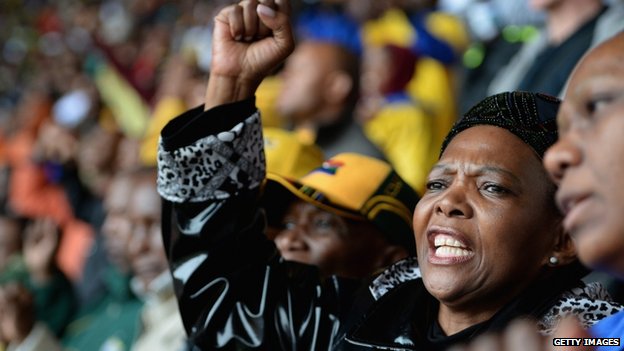World
“We All Have A Good Story To Tell” South Africans Celebrate 20 Years Since Apartheid

PRETORIA(AFP) – President Jacob Zuma led celebrations Sunday on the 20th anniversary of post-apartheid democracy in South Africa, insisting it is closer to its dream of a multi-racial nation despite stubborn inequality, poverty and corruption.
“Our country has done well,” Zuma said at a ceremony held two decades after the first all-race election that saw Nelson Mandela become the country’s first black president.
“We all have a good story to tell.”
“We have moved closer to our cherished dream of a united non-racial, non-sexist and democratic South Africa,” he said at the “Freedom Day” ceremony held in the gardens of the Union Buildings, the seat of government in Pretoria.
South Africa is now the most developed country on the continent and boasts among other things, a strong constitution and an independent judiciary.
But its successes have been sullied by mismanagement and high-level corruption blamed largely on the ANC-led government, as well as a legacy of racial inequality, poverty, rampant crime and a lack of basic services.
The government failings have become a rallying point for the opposition ahead of general elections on May 7, the fifth since the end of decades of sanctioned racial oppression.
– ‘A much better place’ –
But Zuma — who himself has been tarnished by corruption allegations — used his speech to warn rivals not to dismiss the “tremendous” gains in the country of 51 million people.
“I am sure you all agree with me that …we have made South Africa a much better place to live in,” Zuma said.
“We must not deny or downplay these achievements, regardless of our political differences… at any given time, including the election period.”
However, Nobel peace laureate Desmond Tutu, while conceding that two decades of freedom have seen a “heck of an achievement”, said he was pleased Mandela was not alive today to witness the slow pace of transformation.
“I’m glad that Madiba is dead,” Tutu was quoted as telling South Africa’s Sunday Times. “I’m glad that most of these people are no longer alive to see this.”
“I didn’t think there would be a disillusionment soon.”
Zuma meanwhile urged South Africans to turn out in their millions on May 7 for the parliamentary, presidential and local elections.
“Our freedom was not free. It came about through blood, sweat and tears. That is why we must defend it at all cost,” said Zuma.
“We are succeeding to heal the wounds of our brutal and divided past.”
Freedom Day was marked by a full military parade including a 21-gun salute and fly-pasts as well as prayers, music and dance.
A colourful cultural parade entered the Union Buildings gardens to the tune of the South African 2010 World Cup’s official anthem Waka Waka (This Time for Africa).
The Union Buildings complex is where generations of apartheid leaders penned many of the racial laws that Mandela and others fought against for most of their lives.
– Corruption a big thing –
For many South Africans, Freedom Day brings back sweet memories of the euphoria of the election on April 27, 1994, when black, Indian and mixed race voters stood in long lines alongside whites to cast their first ever ballots.
Tutu has said the day felt like “falling in love”.
FW de Klerk, apartheid South Africa’s last president who shared the Nobel peace prize with Mandela, described the day as “our proudest moment as South Africans”.
Twenty years on, the euphoria has died down and the country is counting both the gains and failures of the democratic era.
Poor South Africans have taken their anger onto the streets, protesting over a lack of basic services like water, sanitation, electricity and housing.
The country’s vital mining industry has also been wracked by strikes over pay and conditions.
“Corruption is a really big thing in South Africa,” said student Kingsley Malange, 20, a so-called ‘born free’ who was spared the oppression of apartheid.
But despite anger over graft and glaring socio-economic disparities, the African National Congress is expected to retain power on May 7 election.
The ANC remains the symbol of liberation, while the official opposition, the Democratic Alliance, is still seen as a white party despite making inroads among black people.
ANC supporter Kenosi Tau, 42, came to the celebrations in his yellow election campaign t-shirt and wants his party to get another term in power.
Over 15 million people receive government social grants, with the majority of blacks largely free to live and work wherever they want and a new black middle class burgeoning.
“Although what the government has done is not enough, the little it has done so far is good for us,” said Tau.






